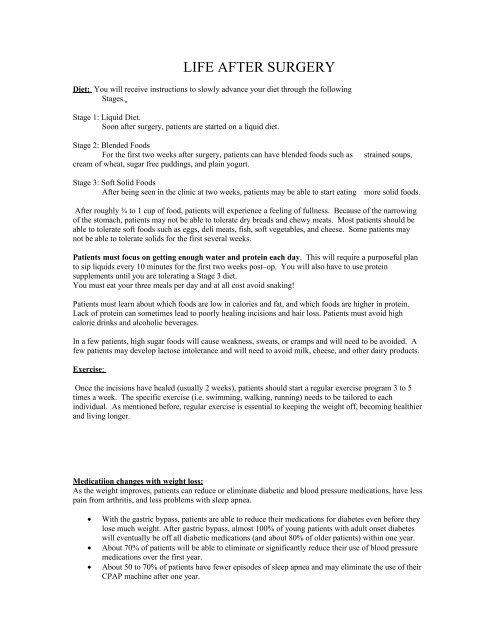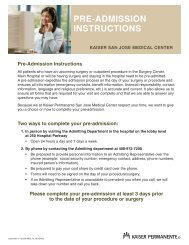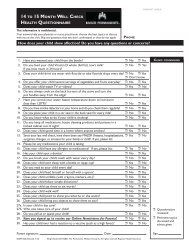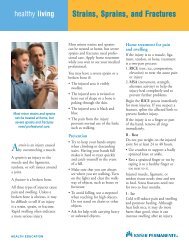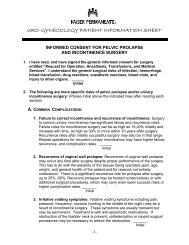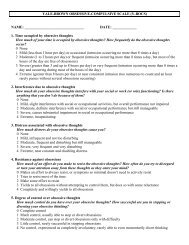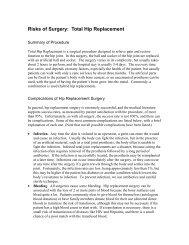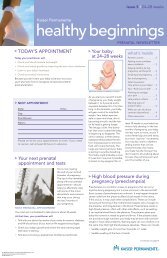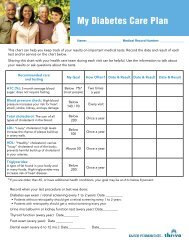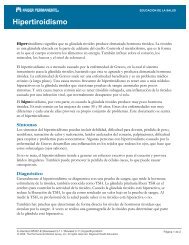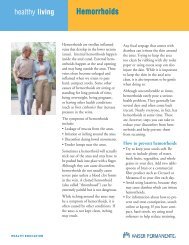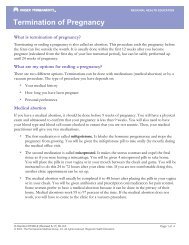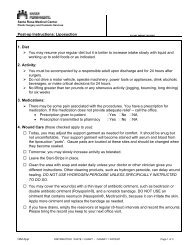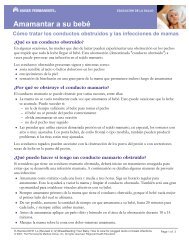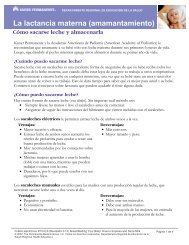Patient Information Book For Gastric Bypass Surgery - permanente.net
Patient Information Book For Gastric Bypass Surgery - permanente.net
Patient Information Book For Gastric Bypass Surgery - permanente.net
You also want an ePaper? Increase the reach of your titles
YUMPU automatically turns print PDFs into web optimized ePapers that Google loves.
LIFE AFTER SURGERY<br />
Diet: You will receive instructions to slowly advance your diet through the following<br />
Stages.<br />
Stage 1: Liquid Diet.<br />
Soon after surgery, patients are started on a liquid diet.<br />
Stage 2: Blended Foods<br />
<strong>For</strong> the first two weeks after surgery, patients can have blended foods such as<br />
cream of wheat, sugar free puddings, and plain yogurt.<br />
strained soups,<br />
Stage 3: Soft Solid Foods<br />
After being seen in the clinic at two weeks, patients may be able to start eating more solid foods.<br />
After roughly ¾ to 1 cup of food, patients will experience a feeling of fullness. Because of the narrowing<br />
of the stomach, patients may not be able to tolerate dry breads and chewy meats. Most patients should be<br />
able to tolerate soft foods such as eggs, deli meats, fish, soft vegetables, and cheese. Some patients may<br />
not be able to tolerate solids for the first several weeks.<br />
<strong>Patient</strong>s must focus on getting enough water and protein each day. This will require a purposeful plan<br />
to sip liquids every 10 minutes for the first two weeks post–op. You will also have to use protein<br />
supplements until you are tolerating a Stage 3 diet.<br />
You must eat your three meals per day and at all cost avoid snaking!<br />
<strong>Patient</strong>s must learn about which foods are low in calories and fat, and which foods are higher in protein.<br />
Lack of protein can sometimes lead to poorly healing incisions and hair loss. <strong>Patient</strong>s must avoid high<br />
calorie drinks and alcoholic beverages.<br />
In a few patients, high sugar foods will cause weakness, sweats, or cramps and will need to be avoided. A<br />
few patients may develop lactose intolerance and will need to avoid milk, cheese, and other dairy products.<br />
Exercise:<br />
Once the incisions have healed (usually 2 weeks), patients should start a regular exercise program 3 to 5<br />
times a week. The specific exercise (i.e. swimming, walking, running) needs to be tailored to each<br />
individual. As mentioned before, regular exercise is essential to keeping the weight off, becoming healthier<br />
and living longer.<br />
Medicatiion changes with weight loss:<br />
As the weight improves, patients can reduce or eliminate diabetic and blood pressure medications, have less<br />
pain from arthritis, and less problems with sleep apnea.<br />
• With the gastric bypass, patients are able to reduce their medications for diabetes even before they<br />
lose much weight. After gastric bypass, almost 100% of young patients with adult onset diabetes<br />
will eventually be off all diabetic medications (and about 80% of older patients) within one year.<br />
• About 70% of patients will be able to eliminate or significantly reduce their use of blood pressure<br />
medications over the first year.<br />
• About 50 to 70% of patients have fewer episodes of sleep apnea and may eliminate the use of their<br />
CPAP machine after one year.


